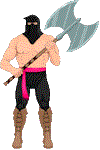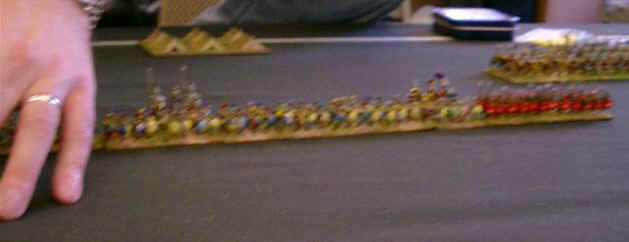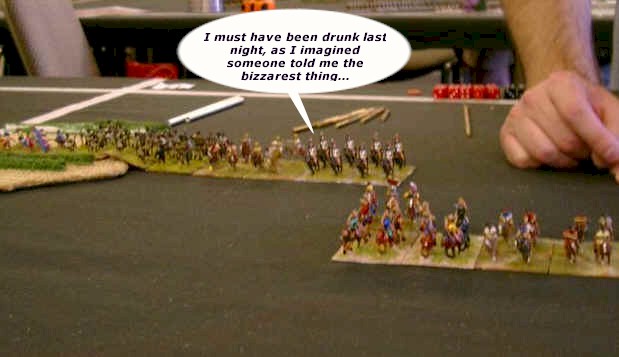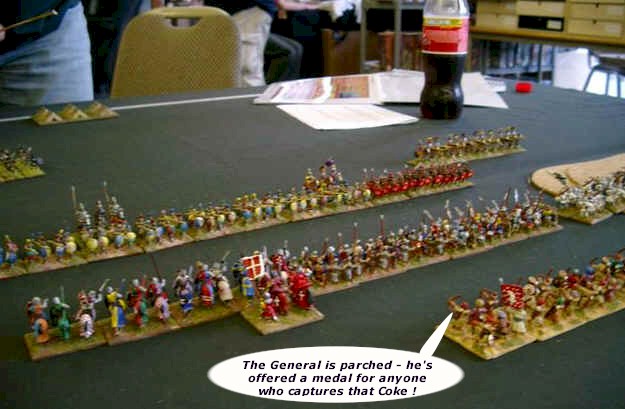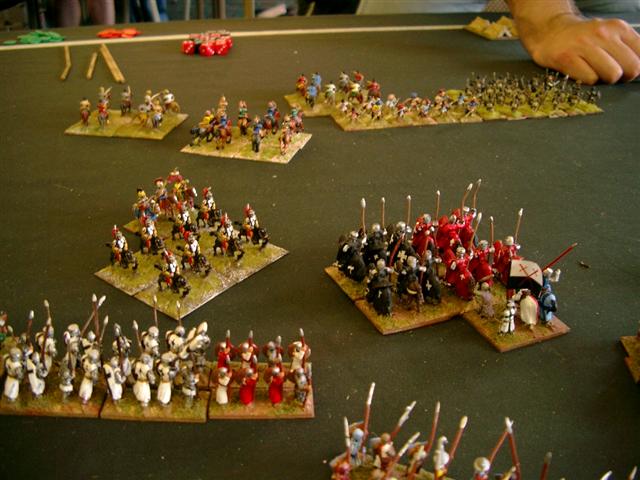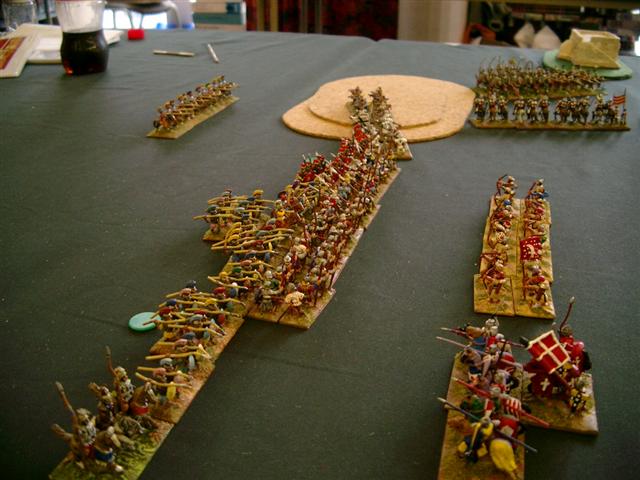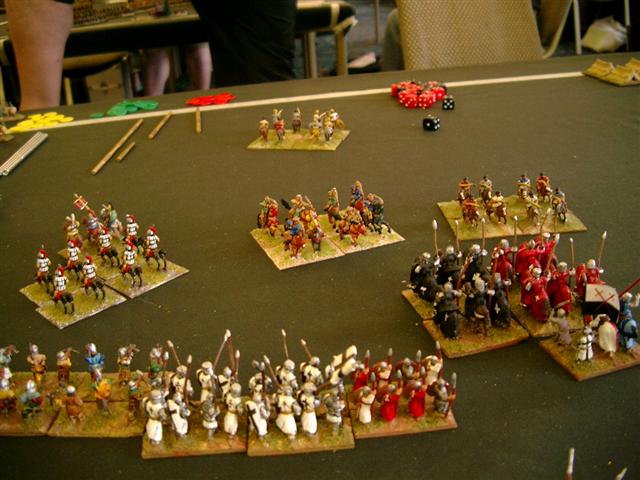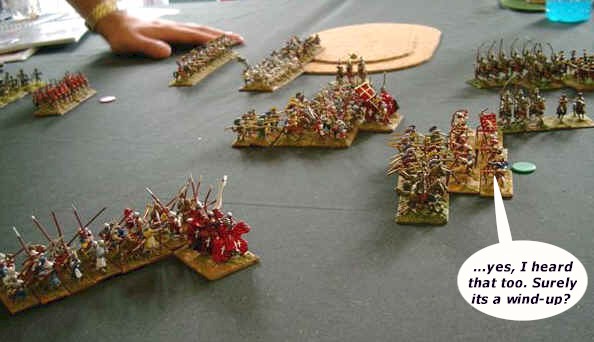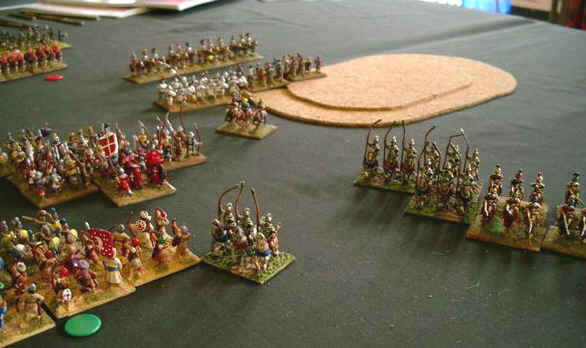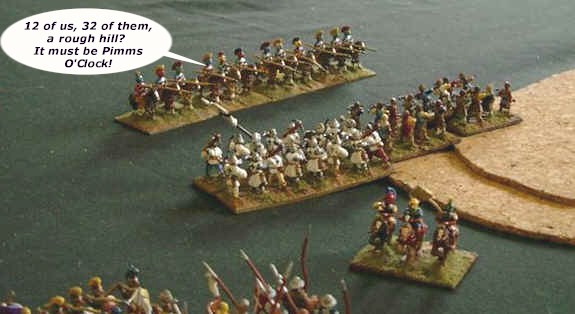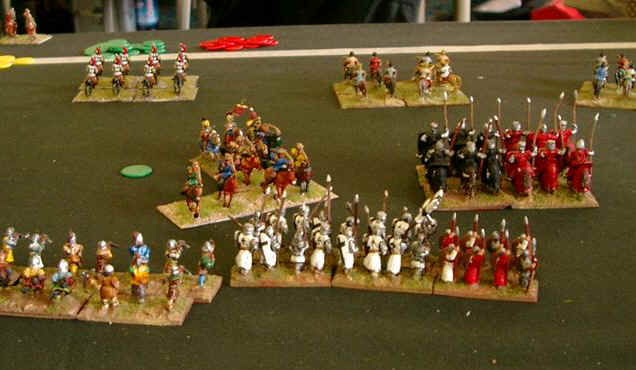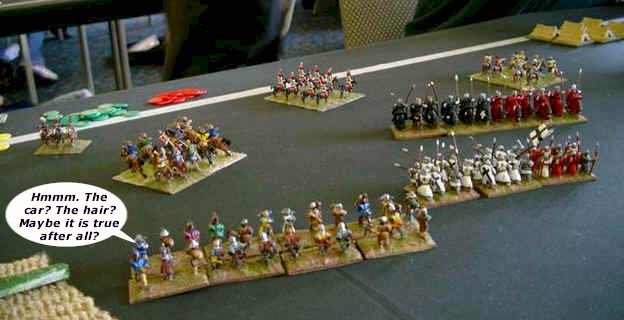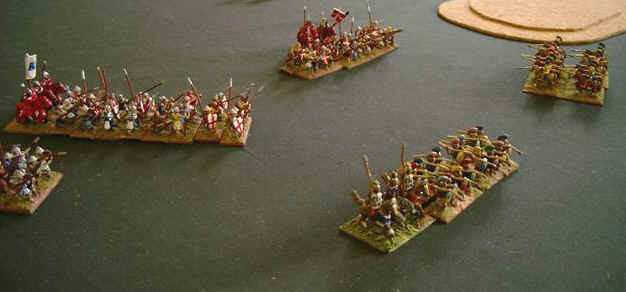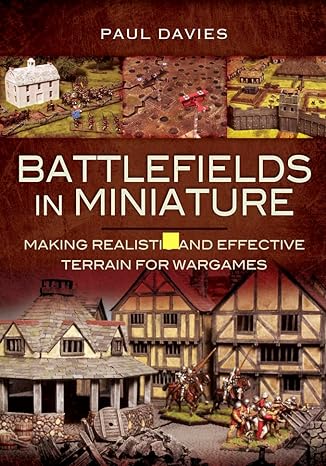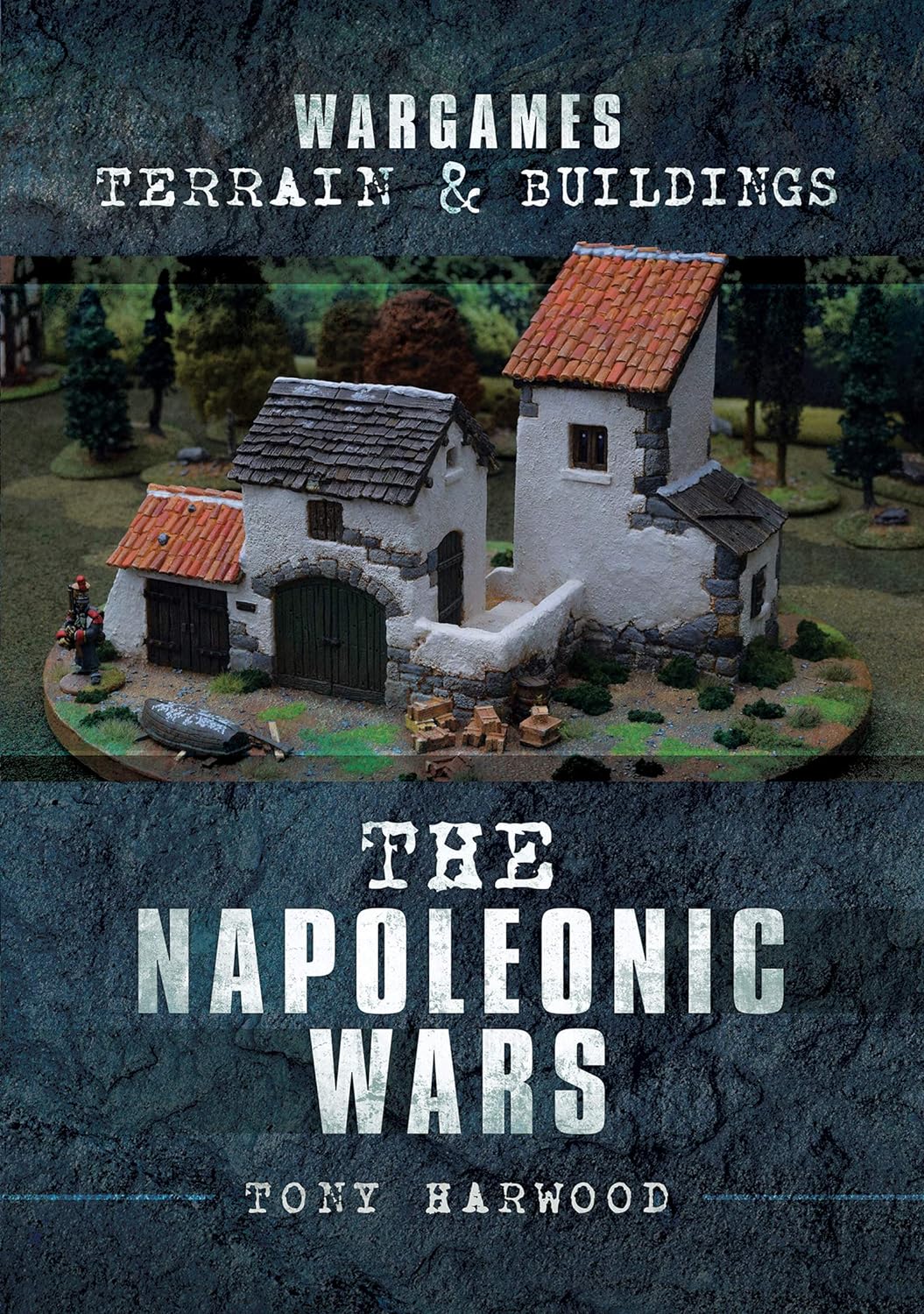Britcon 2007 FoG Game 5
 Game 5 saw me starting late - my alarm clock failed to wake me from my
peaceful alcohol-induced slumber, although having revealed the secret of "MaB"
to the world the previous night I felt justified in being a little late.
Game 5 saw me starting late - my alarm clock failed to wake me from my
peaceful alcohol-induced slumber, although having revealed the secret of "MaB"
to the world the previous night I felt justified in being a little late.
The game saw me facing Dave Ruddocks Lydians - they all appeared to be a bit of a blur, so maybe the alcohol was affecting me still?
In banter on the Slitherine beta testers forum, Dave had let slip that he has played over 8,000 games of FoG using every army from Cavemen to American Civil War Union cavalry, so when he dished out a load of those pesky skirmishing cavalry types I assumed he knew what he was doing. Although he was playing me towards the lower reaches of the leaderboard, so maybe he was actually a muppet too and I may be in with a chance?
Conscious I was a late starter, I felt under a moral obligation to play speedily and so I rushed forwards. This also seemed as good a tactic as anything else given my previous poor showings in the other 4 games.
And lets face it, I was still skull-hammeringly drunk, so that was three votes out of three for the Crusader Banzai!
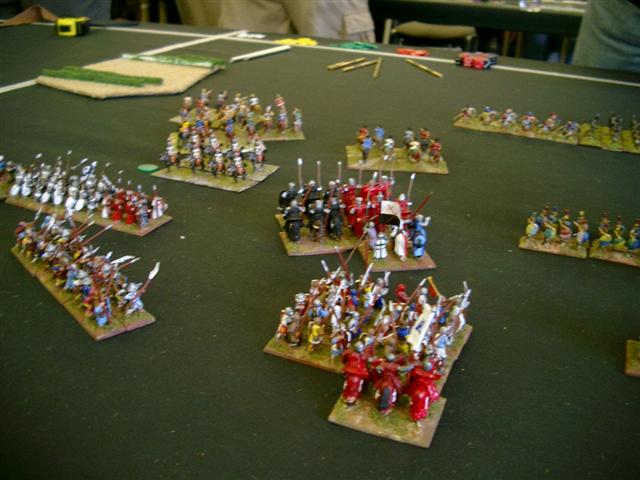
Soon my knights were closing down the light horse rapidly, scattering them in disarray. With nothing in my army able to catch or threaten them, even though it seemed a bit of a waste I was prepared to let the knights have their head just to clear the way for my other troops.
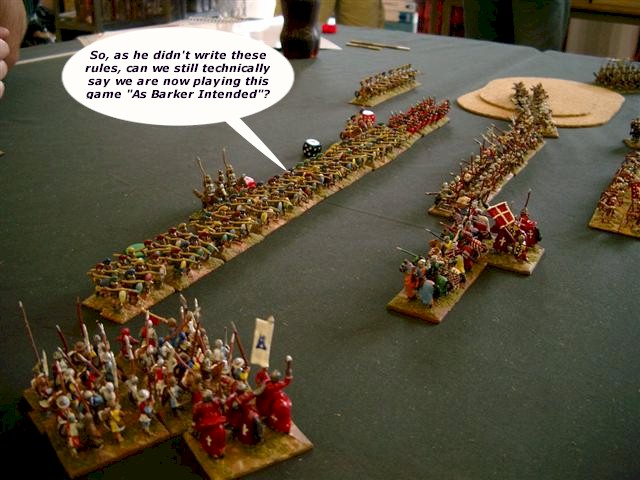
With Dave also pressing forward with his spearmen, the centre was shaping up to be an almighty ding-dong. I had defensive spearmen and knights against a solid line of similar spears. I had even decided to bring my crossbowmen into the fray as they were at the far end of my line safe on a rough hill, and I hoped to use their numbers to give me an edge in what would be a fairly equal combat. A unit of Lydian cavalry was racing round their hill, and it could have been an option for the crossbowmen to turn and interdict them, but I was optimistic my own Turcopoles could hold off the cavalry long enough for me to go for the bigger prize in the middle.
The Brother knights were steaming forward, supported by their foot soldiers. The Lydian skirmishers fled in all directions to try and escape the advancing metal monsters
Clunk!!! The spear lines clashed - with my crappy bowmen acting as a morale-boosting line of support.
Table appeared to be running out for the skirmishers who could be pushed off table - even the baggage looked threatened! If I could win against the Spearmen I might have managed to prove that playing whilst still steaming was the secret to using my army !
But in the middle lots was happening - in all different directions! My spearmen has beaten the left flank of the Lydians, with the extra fighting power of the crossbow unit on the flank proving decisive....and the unwise yet jubilant crossbows had pursued the fleeing spearmen and advanced down from their hill to find themselves facing more skirmishers.
But the middle was still engaged, and on my left the the knights has been smashed in a futile charge and the Lydian spearmen had in turn broken through and hit the soft underbelly of my reserve line. Crusader spearmen attempted to save the day, but they were just too slow to get anywhere near the line of scrimmage before the Lydians started to spear my bowmen.
To add insult to injury my Turcopoles had performed pathetically and Lydian cavalry were sweeping unopposed towards my baggage!
The crossbowmen loaded their weapons and prepared to try and drive off enemy cavalry. With a withering hail of fire they forced the Lydians back
Time surely was running out for the skirmishers - there could surely be no escape from being driven off the edge of the table?
But somehow the tricky blighters eluded the lumbering Crusaders, and squeezed through the grasping fingers of the iron fist of militant Christianity to escape unharmed!
In the middle my reserves were still attempting to catch the only victorious Lydian spear formation, who decided following their colleagues toward my baggage was the best option, and with Benny Hill music playing loudly they raced away pursued by the angry mob!
Over in the distance my crossbowmen found their pursuit of the retreating cavalry and spearmen had brought them into an exposed spot, when the Lydian skirmishers, fresh from escaping the clutches of my right win, surrounded them and showered them with arrows and javelins. They looked around at their desperate situation, and their morale crumbled - they too turned tail and fled.
Amazingly, through the loss of the knights, one spear unit, the reserve bowmen the turcopoles and the crossbowmen (plus the baggage) my army had been broken, and I had grasped defeat from the seeming jaws of victory even though I had broken the bulk of the Lydian spear line and chased their skirmishers to within mere inches of the table edge!
Despite starting 30 minutes late, the full blooded battle on this table had been the first to finish, but it had ended the wrong way with a massive loss for the now increasingly obviously badly designed Crusader army.
Post Match Analysis
Despite shading a tough and brutal the fight against some of the key elements of the Lydian army, I had simply been unable to catch enough of the rest to break more than 50% of their battlegroups - but their victories in the same melee had opened the door to my baggage and my weak reserve lines. This, combined with the very small size of my army condemned me to defeat. The playtest team looked very carefully at the ability of the skirmishers to escape from such tight situations as well as the way my crossbowmen had pursued off their hill and into danger, and scurried back to their secret bat-cave to feed the information into the rules computer to see if modifications were required.... so maybe next time the result will be different!
View My Stats
The Ancient Army List Index
The Rise of Rome (280 BC to 25 BC) Mid Republican Roman ; Late Republican Roman ; Gallic ; Pyrrhic ; Later Carthaginian ; Ancient Spanish ; Later Macedonian ; Later Seleucid ; Later Ptolemaic ; Attalid Pergamene ; Numidian or early Moorish ; Pontic ; Early Armenian ; Parthian ; Later Jewish ; Illyrian ; Spartacus Slave Revolt ; Bosporan ;
Storm of Arrows - Western Europe in the Later Middle Ages (1300 AD to 1500 AD) Medieval French ; 100-yrs War English (Continental) ; 100-yrs War English (Britain) ; Later Medieval Scots ( Britain) ; Later Medieval Scots (Continental) ; Later Scots Isles & Highlands ; Medieval Welsh ; Later Anglo-Irish ; Medieval Irish ; Low Countries ; Later Medieval German ; Italian Condotta ; Swiss ; Free Company ; Medieval Burgundian ; Medieval Danish ; Medieval Swedish ; Medieval Castilian ; Medieval Crown of Aragon ; Medieval Portugese ; Later Granadine ; Navarrese ; Ordonnance French ; Wars of the Roses English ; Ordonnance Burgundian ; Santa Hermandad Nueva Castilian
Immortal Fire - The Greek, Persian & Macedonian Wars (550 BC - 146 BC)
Classical Greek ;
Early Achaemenid Persian ;
Lydian ;
Thracian ;
Syracusan ;
Early Carthaginian ;
Skythian or Saka ;
Kyrenean Greek ;
Late Dynastic Egyptian ;
Alexandrian Macedonian ;
Later Achaemenid Persian ;
Classical Indian ;
Early Successor ;
Early Sarmatian ;
Galatian ;
Hellenistic Greek ;
Graeco-Bactrian ;
Graeco-Indian ;
Indo-Greek :
Legions Triumphant - Imperial Rome (25 BC to 493 AD) Dominate Roman ; Principate Roman ; Foederate Roman ; Later Sarmatian ; Early German ; Dacian or Carpi ; Ancient British ; Caledonian ; Early Alan ; Jewish Revolt ; Sassanid Persian ; Kushan or Indo-Skythian ; Palmyran ; Early Frankish, Alamanni, Burgundi, Limigantes, Rugian, Suevi or Turcilingi ; Western Hunnic ; Early Visigothic & Early Vandal ; Early Ostrogothic, Herul, Sciri or Taifali ; Early Anglo-Saxon, Bavarian, Frisian, Old Saxon or Thuringian ; Gepid or Early Lombard ; Early Scots Irish ; Early Pictish ; Hephthalite Hunnic ;
Swords & Scimitars - The Crusades (1096 AD to 1311 AD) Early Crusader ; Later Crusader ; Fatimid Egyptian ; Georgian ; Seljuk Turk ; Cuman ; Komnenan Byzantine ; Post Latin Conquest Byzantine ; Ilkhanid Mongol ; Mamluk Egyptian ; Cilician Armenian ; Syrian States ; Khwarazmian ; Ayyubid Egyptian ; Middle Serbian ; Middle Bulgarian ; Medieval Cypriot ; Latin Greece ; Pecheneg ;
Eternal Empire - Eastern Europe and the Rise of the Ottomans (1300 AD to 1500 AD) Early Ottoman Turkish ; Later Ottoman Turkish ; Tatar ; Later Russian ; Later Serbian Empire ; Later Bulgarian ; Later Lithuanian ; Later Polish ; Later Teutonic Knights ; Catalan Company ; Middle Hungarian ; Moldavian or Wallachian ; Albanian ; Timurid, White Sheep Turcoman or Black Sheep Turcoman ; Later Hungarian ; Hussite ;
Decline & Fall - Byzantium and Islam (493 AD to 1071 AD) Early Byzantine; Maurikian Byzantine ; Thematic Byzantine ; Nikephorian Byzantine ; Later Moorish ; Later Visigothic ; African Vandal ; Italian Ostrogothic ; Early South Slav ; Lombard ; Avar ; Arab Conquest ; Early Bulgar ; Ummayad Arab ; Abbasid Arab ; Early North African Dynasties ; Khurasanian Dynasties ; Bedouin Dynasties ; Dailami Dynasties ; Pecheneg ; Ghaznavid ; Western Turkish (includes Khazar);
Wolves From The Sea - The Hairy European Dark Ages Post Roman British ; Early Welsh ; Later Scots Irish ; Merovingian Frankish ; Later Pictish ; Early Slavic ; Middle Anglo Saxon ; Astur Leonese ; Andalusian ; Early Navarrese ; Carolingian Frankish ; Viking ; Magyar ; Great Moravian ; Early Scots ; Rus ; Norse Irish ; Early Medieval French ; Early Medieval German ; Norman ; Early Polish ; Anglo Danish ;
Swifter Than Eagles - The Biblical Book Nubian ; Early Libyan ; Later Sumerian or Akkadian ; Early Nomad Allies ; Old or Middle Kingdom Egyptian ; Hyksos ; Mitanni ; Syro-Canaanite ; New Kingdom Egyptian ; Later Minoan or Early Mycenaean ; Hittite Empire ; ; Middle or Early Neo-Assyrian ; Later Mycenaean or Trojan ; Sea Peoples ; Philistine ; Phoenician Allies ; Neo-Hittite And Aramaean ; Later Hebrew ; Mannaean Allies ; Libyan Egyptian ; Urartian ; Median ; Neo-Elamite ; Proto-Arab Allies ; Cimmerian or Early Skythian ; Neo-Assyrian Empire ; Phrygian Allies ; Kushite Egyptian ; Neo-Babylonian Empire ;
Oaf of Fealty - Early Medieval Europe Feudal Catalan and Early Crown Of Aragon ; Early Hungarian ; Taifa Andalusian ; Feudal Navarrese and Aragonese ; Feudal Castilian Leonese or Portuguese ; Fanatic Berber ; Italo-Norman ; Feudal French ; Imperial German ; Feudal German ; Communal Italian ; Papal Italian ; Early Scots Isles And Highlands ; Feudal Scots ; Early Russian ; Feudal Polish ; Anglo-Norman ; Later Welsh ; Early Lithuanian or Samogitian ; Wendish Prussian or Estonian ; Early Medieval Frisia and Other Free Cantons ; Post-Viking Scandinavian ; Early Plantagenet English ; Later Sicilian ; Early Medieval Irish ; Early Anglo-Irish ; Early Teutonic Knights ; Mongol Invasion ; Early Granadine ; Middle Plantagenet English ;
Empires of The Dragon - China, Korea and Japan Erlitou-Shang Chinese ; Early Northern Barbarian Allies ; Early Zhou Chinese ; Yayoi Japanese ; Early Horse Nomad ; Ko Choson Korean ; Warring States To Western Han Chinese ; Qiang And Di ; Three Kingdoms Korean ; Eastern Han Chinese? ; Three Kingdoms W Jin And S Dynasties Chinese ; Kofun Nara Japanese ; Northern Dynasties Chinese ; Later Hindu North Indian ; Later Hindu South Indian ; Central Asian City States ; Western Wei To Early Tang Chinese ; ; Later Horse Nomad ; Tibetan ; Nepalese Allies ; Parhae Korean ; Late Tang To Five Dynasties Chinese ; Khmer Or Champa ; Thai Allies ; Nanzhao ; Pyu Burmese Allies ; Koryo Korean ; Early Heian Japanese ; Pagan Burmese ; Liao ; Song Chinese ; Xi Xia ; Ghurid Afghan ; Jin ; Late Heian To Muromachi Japanese ; Japanese Warrior Monk Allies ; Mongol Conquest ; Moslem Indian Sultanates ; Medieval Indonesian Or Malay ; Yuan Chinese ; Medieval Burmese ; Ming Chinese ; Yi Korean
Blood and Gold - The Americas Olmec ; Teotihuacan ; West Mexican ; Zapotec or Mixtec ; Toltec ; Chinantec ; Aztec ; Tarascan ; Tlaxcalan Confederacy ; Mayan ; Mochica ; Chanca ; Chimu ; Hatun-Colla ; Canari ; Inca ; Mapuche or Araucanian ; Amazonian Forest Tribes ; Tupi ; Chichimec ; Pueblo Culture ; Mound-Builder Culture ; South-Eastern Woodland Culture ; Timucuan ; Eastern Woodland Culture ; Plains Culture ; Pacific North-West Culture
